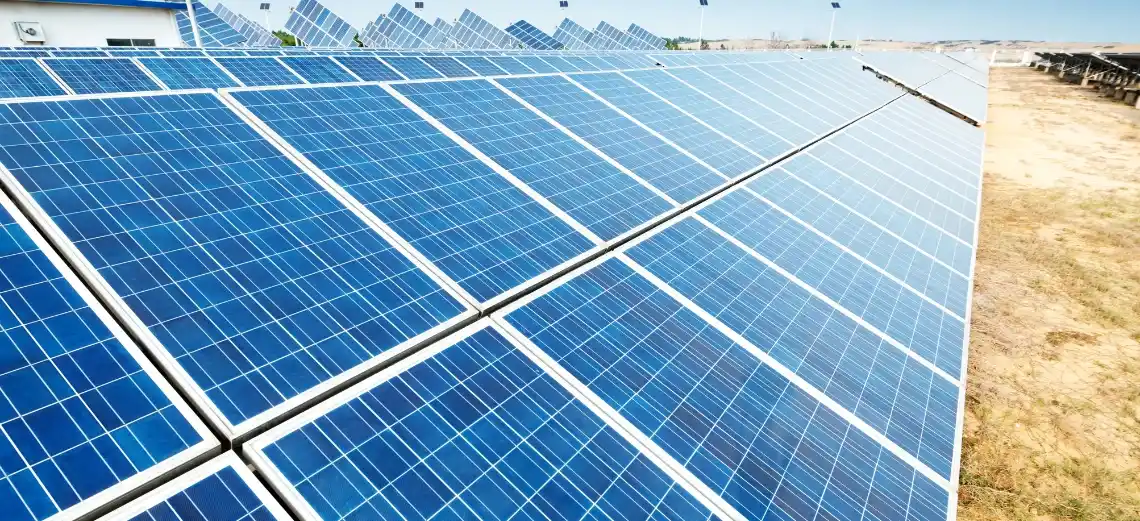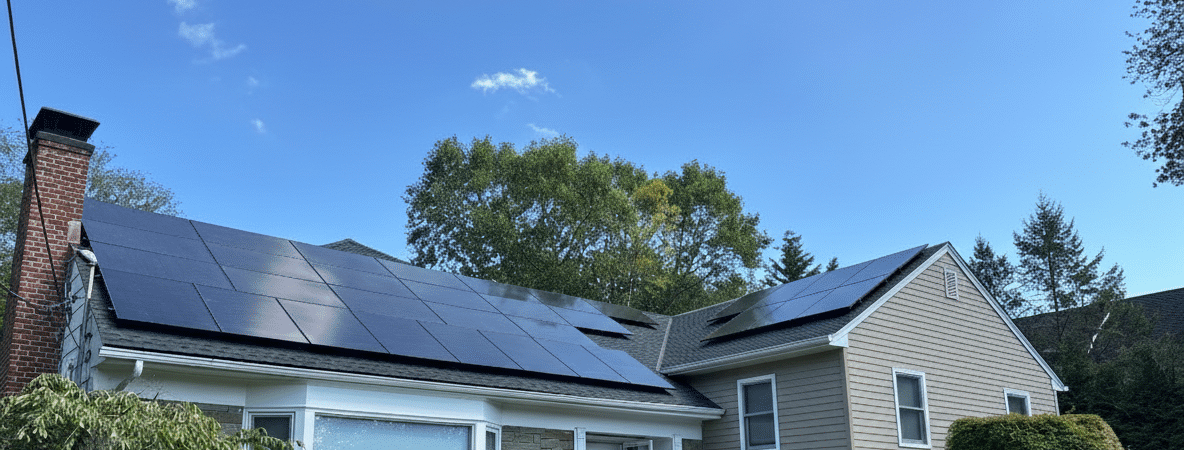People everywhere use solar power to save on energy bills and help the environment. Connecticut, known for its landscapes and diverse seasons, is no exception to this trend. But what does it truly cost to “go solar” in the state? Well, installing solar panels on your property in Connecticut reduces electricity costs and helps you save money.
As of January 2023, information from solar.com indicates that Connecticut is ranked fourth in the US for its average retail electricity price. The rate in Connecticut stands at 30.24 cents per kWh. To provide a clearer perspective on this figure, it’s nearly double the national average of 16.2 cents per kWh. Moreover, this rate is three times the cost per kWh produced by a standard solar system.
In this guide, we dive deep into these topics, offering readers an insightful overview of the cost, savings, & rebates of solar panels in Connecticut. Whether you’re a homeowner considering a switch or simply curious about the solar movement in the state, this post provides all the information you need to make informed decisions.
What Solar Incentives Are Available in Connecticut?
If you’re considering solar energy in Connecticut, you’ll be pleased to know that several incentives can significantly reduce the cost of your investment. Here’s a rundown of the key programs available to help you save:
1. Connecticut State Tax Exemptions
- Property Tax Exemption: When you install solar panels, the added value they bring to your property is exempt from property taxes. This means you can enjoy increased property worth without the additional tax burden.
- Sales Tax Exemption: Connecticut offers a sales tax exemption on solar equipment, making the purchase of your system more affordable.
2. Residential Renewable Energy Solutions Program
This state-specific program provides energy credits for your solar production. By earning credits for the energy your system generates, you can offset your energy bills significantly, leading to long-term savings.
3. Additional Local and Federal Incentives
Keep an eye out for other local programs and federal incentives that may periodically become available. Staying informed about these can maximize your savings and make solar adoption even more accessible.
By leveraging these incentives, residents of Connecticut can reduce both the upfront costs and the overall investment in solar energy, making the transition to sustainable energy both financially smart and environmentally responsible.
How Can Residents Save Money When Going Solar in Connecticut?
Embracing solar energy in Connecticut can be quite a hefty investment, but fortunately, there are several strategies to reduce costs and make the transition more affordable:
1. Harness the Power of Solar Batteries
With Connecticut’s high electricity rates, integrating a solar battery into your system can provide substantial savings. Unlike states with comprehensive net metering, in Connecticut, a solar battery can efficiently store excess energy during sunnier hours. This stored power can offset the expensive electricity you would otherwise draw from the grid, making each kilowatt-hour saved even more valuable.
Moreover, Connecticut offers an attractive incentive through its Public Utilities Regulation Authority (PURA). By installing a solar battery, you might qualify for rebates between $1,000 and $3,000, significantly reducing upfront costs. This financial benefit, paired with the potential increase in property value, makes solar batteries a smart investment for Connecticut homeowners.
2. Consider Oversizing Your Solar System
Energy costs in Connecticut are notably high, and the number of sunny days is below the national average. As such, slightly oversizing your solar panel system can ensure you’re generating ample electricity, minimizing the need to rely on the grid.
A reputable installer can assist in designing a system that accounts for future efficiency drops and local weather patterns. Though adjusting your system capacity may increase initial costs, the savings in energy bills over time can make this approach cost-effective.
3. Maximize State Incentives
Taking advantage of available solar incentives is crucial.
Additionally, state incentives include a property tax exemption and a sales tax exemption, both of which lower the financial burden of going solar. Connecticut’s Residential Renewable Energy Solutions Program is another resource, providing energy credits that accumulate into major savings.
By strategically incorporating these savings tactics, residents in Connecticut can significantly decrease the cost of switching to solar energy, making it a more attainable and rewarding investment.
Key Factors Influencing Solar System Costs in Connecticut
Investing in solar energy in Connecticut can cost anywhere from $12,215 to $26,873. This wide price range can be attributed to several key factors:
- Energy Consumption Needs: Your household’s monthly energy usage significantly impacts the cost. A home with higher energy demands will typically require a larger solar system, leading to increased costs.
- Quality and Brand of Panels: Different solar panel brands offer varying levels of efficiency, warranty, and durability. Premium brands often come with a higher price tag, but they might deliver better performance and longer-term savings.
- Additional Installations: Enhancements such as battery storage systems, solar inverters, and power optimizers can increase the upfront cost but potentially enhance the return on investment through increased energy efficiency and independence from the grid.
Each of these factors plays a crucial role in determining your overall investment, affecting both the initial price and the long-term benefits of moving to solar energy.
Understanding the Impact of Monthly Energy Needs on Your Solar System in Connecticut
When planning a solar power installation in Connecticut, your home’s monthly energy consumption is a critical factor. The system you choose needs to provide enough electricity to cover your typical usage. In Connecticut, households consume an average of 711 kWh per month, based on data from the Energy Information Administration.
System Size and Energy Consumption
The amount of power your home uses directly determines the size of the solar system you’ll need. If your household consumes more energy than the state average, you’ll require a larger system to ensure adequate energy production. Conversely, using less energy than average allows for a smaller, more cost-effective setup.
Cost Implications
The cost of your solar system is closely linked to its size. A larger system comes with higher initial costs but potentially offers more savings over time by reducing or eliminating electricity bills. In Connecticut, where energy prices are high, investing in a larger solar installation often proves financially beneficial in the long run.
Strategic Sizing
It’s important to size your solar system to meet—or even slightly exceed—your energy needs. While oversizing can be seen as an unnecessary expense in some regions, in Connecticut, it often results in long-term savings due to the state’s high energy costs.
Opting for a smaller system may lower your initial investment, but you’ll sacrifice ongoing savings, ultimately diminishing the overall return on your investment.
By carefully evaluating your monthly energy needs and considering Connecticut’s specific energy landscape, you can make informed decisions about the size and cost of your solar system, ensuring it meets your financial and energy goals.
Additional Products to Install with Solar Panels and Their Cost Implications
When you decide to go solar, there are several supplementary products you might consider to enhance your system. One of the most popular options is a solar battery.
Benefits of Installing a Solar Battery in Connecticut
Connecticut homeowners have increasingly turned to solar batteries as a companion to their solar panel installations. While adding a battery does increase initial installation costs, the long-term advantages cannot be ignored.
1. Power Reliability During Blackouts
Connecticut’s weather can be unpredictable and sometimes severe, leading to power outages. A solar battery offers a backup power source, ensuring your home stays powered even during blackouts. This reliability is invaluable, providing peace of mind during storms or other emergencies.
2. Energy Storage for Optimum Use
By storing solar energy generated during the day, a battery allows you to use this power when the sun isn’t shining. This capability is particularly beneficial in Connecticut due to the state’s high energy costs. Instead of drawing expensive electricity from the grid at night, you can use stored solar energy, significantly lowering your utility bills.
3. Financial Savings Over Time
Though an initial investment of around $10,000 for a high-quality solar battery might seem steep, it can lead to substantial savings in Connecticut. Given the high electricity rates, utilizing stored solar power reduces your dependency on grid electricity, translating to lower energy expenses over the years.
In summary, while the upfront cost is higher, installing a solar battery in Connecticut can offer improved energy reliability, effective use of solar power, and financial savings, aligning perfectly with the state’s energy needs and weather conditions.
Exploring Solar Financing Options in Connecticut
When considering solar panel installation in Connecticut, understanding your financing options is crucial. Here’s a breakdown of the various methods available and insights into which might be most cost-effective for you.
1. Cash Purchase
Paying upfront in full is often the most cost-effective approach. By purchasing your solar system outright, you avoid any interest payments and maximize long-term savings.
2. Solar Loans
Solar loans provide an opportunity to spread out payments over time, making solar systems more accessible without a large initial investment. Be mindful that interest rates will increase the total cost compared to a cash purchase. However, with no down payment often required, loans are more manageable for many homeowners.
3. Solar Leases
Opting for a solar lease involves paying a fixed monthly fee to use the solar panels, while the generated energy helps lower your utility bills.
4. Power Purchase Agreements (PPAs)
PPAs offer a unique setup where you pay for the energy produced by the installed solar panels at a rate lower than typical utility charges. Although initially intriguing due to zero upfront costs, PPAs tend to provide the least savings over time.
Choosing the Most Cost-Effective Option
For those who can afford it, a cash purchase typically delivers the maximum savings. It reduces long-term costs and takes full advantage of available tax credits. Solar loans stand as a viable option for those needing financing, offering significant benefits without the hefty initial outlay.
To make an informed decision, it’s advisable to use a solar calculator to estimate the specific costs and savings for your home in Connecticut. This can help you better understand which financing option aligns best with your budget and energy goals.
Savings from Solar Energy
Savings from solar energy can be substantial and come in various forms. Here are some of the key ways in which individuals, businesses, and communities in Connecticut can save money by using solar energy:
Electricity Bills
One of the most significant savings from solar energy is the reduction of higher electricity bills. Solar panels produce electricity from sunlight, which can offset or even eliminate the requirement to purchase electricity from the grid. This can lead you to save a significant amount over the lifetime of solar panels.
Reduced Maintenance Costs
Solar panels only need a little maintenance after getting installed. Just clean and check them once in a while to make sure they work well. This can save you money on maintenance compared to other energy production methods.
Long-Term Investments
Solar panels in Connecticut can last for a more extended period, usually around 25 to 30 years or even more. This means that the money you invested in solar panel installation can help you save for many years after the solar panels have covered their cost. This leads you to have more money in the long run.
Increased Resale Value of Your Home
Homes and businesses with solar installations tend to have higher property values. A solar energy system can make a property more attractive to potential buyers, leading to better resale value. Based on the research by the National Renewable Energy Laboratory, every $1 saved on utility bills enhances the value of your property by $20 in the USA, including Connecticut. This equates to a more excellent market value when it comes time to sell your home.
Environmental Savings
While not directly financial, it’s important to note that using solar energy has positive environmental impacts, including reduced greenhouse gas emissions & air pollution. This can lead to societal savings in terms of environmental remediation efforts.
Cost of Solar Panels in Connecticut
The solar panel cost Connecticut depends on various factors, including the size of your solar system, solar panel type, installation costs, permits, taxes, and rebates. These factors are detailed as follows:
Decreasing Cost Trend
In the last ten years, advancements in technology and the efficiencies gained through larger-scale manufacturing have all contributed to a consistent reduction in the cost of solar panels. This trajectory is foreseen to persist, further enhancing the affordability of solar energy in the times ahead.
Return on Investment (ROI)
Despite the initial costs, the return on investment for solar panels in Connecticut is competitive, especially when considering savings from monthly electricity bills, state incentives, and the potential increase in property value.
Financing Options
Most people who own homes pay some of the money at a time for solar panels. There are different ways to pay for them, like solar loans, leases, & power purchase agreements. Each choice has good and bad points that can vary from solar panel cost Connecticut in the long run.
Does Connecticut offer any state solar tax credits or incentives?
While Connecticut does not offer a specific state tax credit for solar panel installations, residents are still eligible for significant savings. Connecticut does provide additional incentive programs to promote solar energy adoption. Here are a few noteworthy options:
- Battery Storage Rebate: Homeowners installing solar systems with battery storage can benefit from rebates specifically designed to offset costs.
- Renewable Energy Credits: Residents can earn credits for the energy produced by their solar panels, which may be sold or used to reduce their energy bills.
These programs make solar energy a financially viable and sustainable option for many Connecticut residents.
Conclusion
We have highlighted the economic and environmental advantages of adopting solar panels in Connecticut. By harnessing the sunlight in the region, residents can significantly reduce their energy bills while positively contributing to sustainability efforts. Furthermore, the availability of rebates and incentives further ease the deal, making solar panel installation an even more appealing investment.
For those looking to transition to solar energy, Infinity Energy stands out as a reliable partner for solar panel installation services in Connecticut. Our expertise and experience in the field enable us to guide homeowners through the process, from assessing costs and savings to facilitating the installation. Contact us today to get a free estimate!












